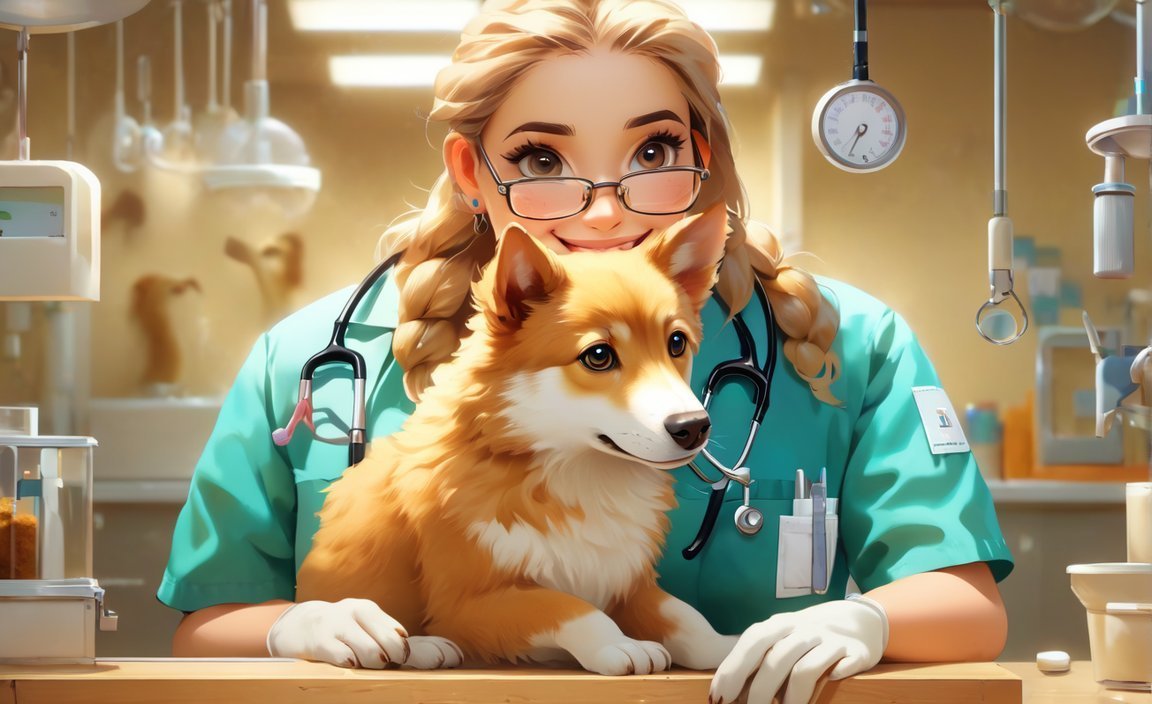Are you curious about the intriguing world of veterinary medicine? In this article, we dive into 10 fascinating facts about being a veterinarian, offering unique insights into the dynamic field of animal healthcare. From the complexities of animal communication and behavior to the incredible moments of healing and saving lives, we explore the joys and challenges that come with this rewarding profession. Join us as we shed light on the profound impact veterinarians have on the animal kingdom and their human companions in [10 Fascinating Facts About Being a Veterinarian: Insights into Animal Healthcare].

Key Takeaways:
- Veterinarians undergo extensive education and training.
- They have the option to specialize in various fields.
- Veterinarians treat a wide range of animals.
- They play a crucial role in public health.
- Veterinary medicine has a long history.
- Veterinarians are capable of performing complex surgeries.
- They provide preventive care to animals.
- Veterinarians work in diverse settings.
- Approximately 80% of veterinarians are women.
- 61% of all human diseases originated in animals.
10 Interesting Facts About Being a Veterinarian
Being a veterinarian is a fulfilling and captivating profession that involves caring for animals and ensuring their well-being. Here are 10 interesting facts about the life of a veterinarian, shedding light on the intricate world of animal healthcare.
1. Extensive Education and Training
Becoming a veterinarian requires years of education and training. Veterinarians typically complete four years of undergraduate studies followed by four years of veterinary school. This robust educational foundation equips them with the knowledge and skills necessary to diagnose and treat various animal illnesses and injuries.
2. Specialization in Various Fields
Just like human doctors, veterinarians can specialize in specific areas of animal healthcare. Some examples of veterinary specialties include dermatology, cardiology, oncology, dentistry, and surgery. This specialization allows veterinarians to provide specialized care for animals with specific medical conditions.
3. Treating a Wide Range of Animals
Contrary to popular belief, veterinarians don’t only treat dogs and cats. They are trained to care for a wide variety of animals, including small pets like rabbits and guinea pigs, as well as large animals like horses, cows, and even exotic species. This diversity makes each day as a veterinarian unique and exciting.
4. Crucial Role in Public Health
Veterinarians play a vital role in ensuring public health. They work to prevent, control, and eliminate diseases that can be transmitted from animals to humans, known as zoonotic diseases. By maintaining herd health and implementing preventive measures, veterinarians help safeguard both animal and human populations.
5. Long History of Veterinary Medicine
The practice of veterinary medicine has a rich and lengthy history. Ancient civilizations recognized the need for animal healthcare and developed rudimentary methods for treating animals. Today, veterinary medicine continues to evolve, with advancements in technology and research enhancing the quality of care provided to animals.
6. Complex Surgeries and Procedures
Veterinarians are skilled in performing complex surgeries and specialized procedures on animals. From orthopedic surgeries to delicate eye procedures, veterinarians have the expertise to handle a wide range of medical interventions. These surgeries can greatly improve an animal’s quality of life and even save lives.
7. Provision of Preventive Care
One of the crucial roles of a veterinarian is providing preventive care to animals. This includes routine vaccinations, parasite control, dental care, and wellness examinations. Preventive care helps keep animals healthy and reduces the risk of illnesses and diseases.
8. Working in Different Settings
Veterinarians have the opportunity to work in various settings. They can be found in private clinics, research laboratories, zoos, livestock farms, or even in government agencies. This diversity allows them to contribute to the animal healthcare field in various capacities.
9. Increasing Number of Female Veterinarians
The veterinary profession has seen a significant increase in the number of women veterinarians over the years. Approximately 80% of veterinarians today are women, highlighting the growing representation of women in this field. Their passion and dedication bring valuable contributions to the animal healthcare industry.
10. Link Between Animal and Human Health
Animal and human health are intricately connected. Research shows that 61% of all human diseases originated in animals. Veterinarians play a crucial role in monitoring and preventing the transmission of diseases from animals to humans. By promoting animal health, veterinarians contribute to the overall well-being of both animals and humans.
In conclusion, being a veterinarian is a rewarding and comprehensive profession that allows professionals to make a difference in the lives of animals and their human companions. The fascinating facts discussed above highlight the expertise, dedication, and important role that veterinarians play in the field of animal healthcare.
Did you know that hawksbill sea turtles have some fascinating facts? Check out these 10 fun facts about hawksbill sea turtles and be amazed! 10 fun facts about hawksbill sea turtles
Discover the surprising human foods that dogs can eat without any harm. Find out more about these 10 safe and tasty options for your furry friend. 10 human foods dogs can eat
Are you curious about the human foods that are actually good for dogs? Explore this list of 10 nutritious options that can enhance your canine’s diet. 10 human foods that are good for dogs
Alligator snapping turtles have some truly interesting facts. Dive into these 10 captivating facts and learn more about this remarkable species. 10 interesting facts about alligator snapping turtles
Falcons are incredible birds of prey with intriguing qualities. Uncover 10 fascinating facts about falcons and expand your knowledge about these majestic creatures. 10 interesting facts about falcons
Hawksbill sea turtles are not only beautiful but also full of surprises. Delve into these 10 interesting facts about hawksbill sea turtles and deepen your appreciation for these incredible creatures. 10 interesting facts about hawksbill sea turtles
If you’re intrigued by hawksbill turtles, you’re in for a treat! Discover 10 interesting facts about hawksbill turtles that will leave you in awe of their uniqueness. 10 interesting facts about hawksbill turtles
Snapping turtles may appear fearsome, but they have some extraordinary characteristics. Uncover 10 intriguing facts about snapping turtles and gain a newfound respect for these remarkable reptiles. 10 interesting facts about snapping turtles
The hawksbill sea turtle is a true marvel of nature. Explore 10 interesting facts about the hawksbill sea turtle and be captivated by their remarkable qualities. 10 interesting facts about the hawksbill sea turtle
The Unique Challenges of Diagnosing and Treating Animals
Being a veterinarian comes with its unique set of challenges when it comes to diagnosing and treating animals. From understanding their communication cues to navigating ethical dilemmas, veterinarians face a range of difficulties to ensure the well-being of their furry patients. Here, we explore the fascinating challenges that veterinarians encounter in their everyday practice.
1. Decoding Animal Communication and Behavior
Animals cannot express their symptoms or discomfort in the same way humans do. Veterinarians must rely on their observation skills and knowledge of animal behavior to interpret subtle cues and diagnose health issues. The challenge lies in deciphering the language of animals and understanding their unique communication styles.
2. Identifying Subtle Symptoms
Unlike humans, animals can’t clearly articulate their symptoms, making it harder to pinpoint ailments. Veterinarians must be skilled at identifying subtle changes in behavior, eating patterns, and appearance to uncover underlying health issues. This requires a keen eye for detail and the ability to ask the right questions to gather vital information from pet owners.
3. Dealing with Fearful and Aggressive Animals
Veterinarians often encounter animals that are fearful or aggressive due to pain, stress, or past traumas. Treating such animals can be challenging, as they may resist examination or even lash out. Veterinarians must employ patience, empathy, and exceptional handling techniques to ensure the safety of both themselves and the animals they treat.
4. Navigating Ethical Dilemmas
One of the unique challenges veterinarians face is navigating ethical dilemmas that arise when the interests of the owner conflict with the best interests of the animal. Determining the right course of action can be complex and emotionally demanding. Veterinarians must make difficult decisions while considering both medical expertise and the animal’s quality of life.
5. Staying Up-to-Date with Advancing Veterinary Medicine
The field of veterinary medicine is constantly evolving, with new treatments, medications, and surgical techniques emerging. Veterinarians must stay updated with the latest research and advancements to provide the best care to their animal patients. However, keeping up with the rapid pace of progress can be a significant challenge, requiring dedication to continuous learning and professional development.
6. Balancing Medical Expertise with Financial Constraints
Treating animals can be costly, and not all pet owners have the financial means to cover extensive medical procedures. Veterinarians often face the challenge of balancing their medical expertise with the financial constraints of their clients. They must find the appropriate treatments that suit the pet’s needs while considering the owner’s financial situation.
7. Coping with Emotional Toll
The well-being and lives of animals are in the hands of veterinarians. Saving lives and ensuring the best possible outcomes for their patients can be incredibly rewarding, but it can also take an emotional toll. Veterinarians must learn to cope with the highs and lows of their profession, finding healthy ways to manage stress and compassion fatigue.
8. Collaborating with Pet Owners
Veterinary care is a collaborative effort between veterinarians and pet owners. However, not all pet owners may be compliant or fully understand the importance of following through with treatment plans. Veterinarians face the challenge of effectively communicating with pet owners, aligning their goals and priorities, and promoting responsible pet ownership.
9. Maintaining Balance in an Ever-Changing Environment
Veterinarians work in a dynamic and ever-changing environment. They must adapt to new regulations, changing practice norms, and technological advancements while providing exceptional care to their animal patients. This requires the ability to juggle multiple responsibilities, stay organized, and continuously improve their skills to meet evolving veterinary standards.
10. Addressing the Impact of Antimicrobial Use
With growing concerns about antimicrobial resistance, veterinarians are faced with the challenge of reassessing the use of diagnostic testing and antimicrobials in veterinary practice. Striking a balance between effective treatment and responsible use of medications is crucial to ensure the long-term health and well-being of animals and prevent the spread of resistant infections.
Key Takeaways:
- Veterinarians face the challenge of interpreting animal communication and behavior to diagnose health issues effectively.
- Identifying subtle symptoms in animals is a challenge, as they cannot clearly express their discomfort.
- Treating fearful and aggressive animals requires exceptional handling techniques and patience.
- Navigating ethical dilemmas arises when the owner’s interests conflict with the best interests of the animal.
- Keeping up with advancing veterinary medicine requires dedication to continuous learning and professional development.
- Balancing medical expertise with financial constraints is a challenge veterinarians often face.
- Coping with the emotional toll of saving lives and dealing with the highs and lows of the profession is essential.
- Effective communication and collaboration with pet owners are crucial for optimal patient outcomes.
- Veterinarians must maintain balance amidst an ever-changing environment in veterinary care.
- Addressing the appropriate use of diagnostic testing and antimicrobials is a challenge in veterinary practice.
Source:
– National Center for Biotechnology Information. Ethical Challenges Posed by Advanced Veterinary Care in Companion
– MDPI. Veterinary Diagnostic Practice and the Use of Rapid
The Importance of Veterinary Communication and Empathy
As a veterinarian, effective communication and empathy are essential skills that play a significant role in providing optimal care for animals and building strong relationships with their owners. In the world of veterinary medicine, empathy is not just a virtue but also a crucial tool for success. Let’s explore why veterinary communication and empathy are so important in this field.
1. Building Trust and Rapport
When pet owners bring their beloved animals to a veterinary clinic, they are often anxious and concerned about their well-being. By expressing empathy and actively listening to their worries and emotions, veterinarians can build trust and establish a strong rapport with clients. This open and trusting relationship allows for better collaboration in making informed decisions for the animal’s health.
2. Enhancing Client Satisfaction
Studies have shown that effective communication of empathy in veterinary practice is directly associated with higher client satisfaction. When veterinarians show genuine concern and compassion, it reassures pet owners that their animal is in good hands. This can lead to increased confidence in the veterinarian’s abilities and overall satisfaction with the veterinary experience.
3. Improving Animal Care and Outcomes
Empathy extends beyond connecting with clients; it also plays a vital role in understanding and meeting the needs of animals. Veterinarians who can empathize with their patients can better decode animal communication and behavior, enabling them to make accurate diagnoses and provide appropriate treatment. This understanding helps veterinarians identify subtle symptoms that animals may exhibit, even when they can’t clearly express their discomfort.
4. Navigating Ethical Dilemmas
Veterinarians often face ethical dilemmas when the best interests of the animal conflict with the wishes or limitations of the owner. In such situations, effective communication and empathy are crucial in guiding pet owners towards making decisions that prioritize the well-being of the animal. By understanding the owner’s perspective while advocating for the animal’s welfare, veterinarians can navigate these challenging situations with compassion and professionalism.
5. Fostering Collaborative Partnerships
In veterinary practice, effective communication and empathy are essential for building collaborative partnerships between veterinarians, clients, and the veterinary team. Strong communication skills enable veterinarians to listen to client observations, answer questions, and provide guidance. By actively involving clients in the decision-making process and considering their opinions and concerns, veterinarians can establish partnerships that promote the best possible outcomes for the animals in their care.
6. Managing Emotional Toll
Being a veterinarian can be emotionally challenging, as it involves dealing with sick and injured animals, as well as difficult situations such as euthanasia. The emotional toll of the profession must be managed through healthy coping mechanisms. Effective communication and empathy can help veterinarians connect with their own emotions and those of their clients, allowing for better emotional support and reducing burnout.
7. Continual Learning and Growth
Veterinary medicine is continuously evolving, with new research and advancements shaping the field. Effective communication and empathy play a crucial role in the veterinarian’s commitment to lifelong learning. By staying open to new ideas, engaging in professional development, and actively seeking feedback, veterinarians can adapt and grow while providing the best possible care for animals.
Key Takeaways:
– Effective communication and empathy are crucial for building trust and rapport with clients, resulting in higher client satisfaction in veterinary practice.
– Empathy enables veterinarians to understand and meet the needs of animals, leading to improved diagnoses and outcomes.
– Communicating empathy helps veterinarians navigate ethical dilemmas and make decisions that prioritize the animal’s well-being.
– Collaborative partnerships between veterinarians, clients, and the veterinary team are fostered through effective communication and empathy.
– Veterinarians must manage the emotional toll of their profession through healthy coping mechanisms and by offering emotional support to clients.
– Continued learning and growth in veterinary medicine are facilitated by effective communication and empathy.
Sources:
- Veterinary Practice – The importance of empathy
- BMC Veterinary Research – An integrated review of the role of communication in veterinary
The Rewarding Moments of Healing and Saving Animal Lives
Being a veterinarian is a truly remarkable profession. Every day, we have the privilege of healing and saving animal lives, which brings immense joy and satisfaction. The rewarding moments we experience go far beyond the technical aspects of veterinary medicine – they embody the deep connection we share with animals and the impact we have on their well-being.
Understanding Animal Communication and Behavior
As veterinarians, we must decipher animal communication and behavior to effectively diagnose health issues. Animals cannot clearly express their discomfort, so we rely on our expertise and observations. This challenging yet fascinating aspect of our work allows us to uncover the subtle signs and symptoms that indicate a problem.
The Challenge of Treating Fearful and Aggressive Animals
While working with animals, we often encounter fearful and aggressive individuals. It requires exceptional handling techniques, patience, and a deep understanding of animal behavior to provide them with the care they need. Overcoming the challenges of treating these animals is incredibly rewarding, as it helps restore their trust and improves their quality of life.
Navigating Ethical Dilemmas
Veterinarians frequently face ethical dilemmas when the owner’s interests conflict with the best interests of the animal. Making decisions that prioritize the animal’s well-being can be emotionally complex. However, by upholding our commitment to animal health and welfare, we can navigate these dilemmas and ensure the best possible outcomes for our patients.
The Continuous Pursuit of Knowledge
In the field of veterinary medicine, learning never stops. As professionals, we must stay updated with the latest advancements and techniques through continuous education. This dedication to lifelong learning allows us to provide the best care and treatment options for our patients.
Balancing Medical Expertise with Financial Constraints
Veterinarians face the challenge of balancing their medical expertise with the financial constraints some pet owners may face. We strive to provide high-quality care while considering the affordability of treatments. Finding the right balance between medical excellence and financial considerations is both a challenge and an opportunity to serve our clients and their animals.
Managing the Emotional Toll
The emotional toll of being a veterinarian should not be underestimated. Witnessing the suffering of animals and making difficult decisions can be emotionally challenging. It is crucial for us to develop healthy coping mechanisms and seek support from colleagues and loved ones to ensure our emotional well-being.
Effective Communication and Collaboration
Effective communication and collaboration with pet owners are paramount for successful outcomes. By building trust and rapport, we can work together to make informed decisions for the animal’s health. This open line of communication fosters a strong relationship and ultimately improves patient care.
Adapting to an Ever-Changing Environment
Veterinary care is constantly evolving, with new research and technologies emerging. Veterinarians must adapt to this ever-changing environment to provide the best possible care for animals. Embracing advancements and staying up-to-date allows us to improve our practice and enhance animal health outcomes.
Key Takeaways:
- Veterinarians must decode animal communication and behavior to diagnose health issues effectively.
- Treating fearful and aggressive animals requires exceptional handling techniques and patience.
- Navigating ethical dilemmas arises when the owner’s interests conflict with the best interests of the animal.
- Veterinarians must stay updated with advancing veterinary medicine through continuous learning.
- Balancing medical expertise with financial constraints is a challenge veterinarians often face.
- The emotional toll of the profession must be managed through healthy coping mechanisms.
- Effective communication and collaboration with pet owners are crucial for optimal patient outcomes.
- Veterinarians must adapt to an ever-changing environment in veterinary care.
Sources:
– World Veterinary Day
– One Green Planet

FAQ
Q1: What education and training do veterinarians need?
A1: Veterinarians must have a bachelor’s degree to ensure they are well-educated and have the necessary knowledge to treat animals. [^1^]
Q2: What is the role of veterinarians in society?
A2: Veterinarians play a crucial role in society by diagnosing and treating medical conditions in animals and providing preventive care. They also have compassion for animals and can effectively communicate with pet owners. [^2^] [^3^]
Q3: What are the benefits of being a veterinarian?
A3: Being a veterinarian offers several benefits, including the opportunity to help animals, competitive salaries, and the ability to interact with the community. [^5^]
Q4: What areas can veterinarians specialize in?
A4: Veterinarians can specialize in different areas of animal care, such as surgery or diagnostics. Veterinary school is rigorous, and veterinarians acquire specialized knowledge in their chosen field. [^6^]
Q5: What are some remarkable stories showcasing the bond between humans and animals?
A5: Animals have been known to step in and save human lives in miraculous ways, showcasing the remarkable bond between humans and animals. These stories highlight the extraordinary connection between species. [^8^]
















